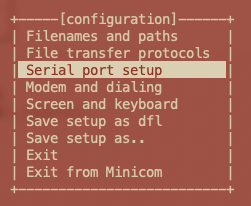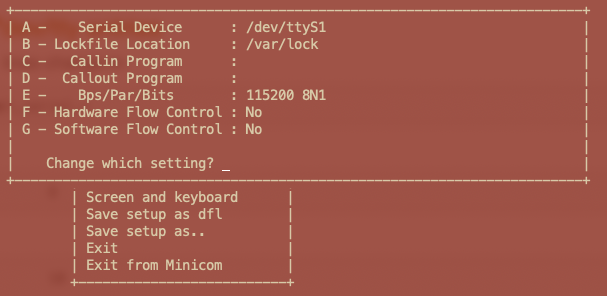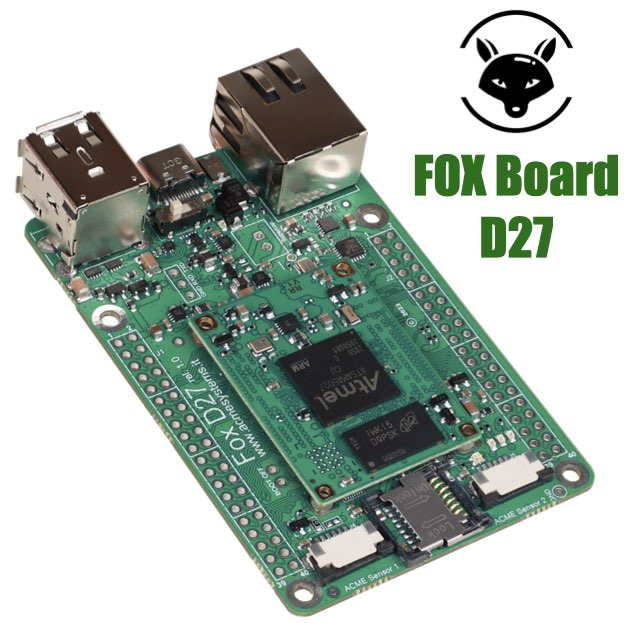Roadrunner technical documentation Buy
Using up to 10 serial ports on RoadRunner SOM
This article has been tried with a Linux Kernel 4.19.134 and a Debian Buster 10 distribution.
This is pheriperals available to implements the serial ports. When more IOset are listed the peripheral lines can be moved on another set of pins to avoid conflicts with other peripherals.
- UART0 (IOset1)
- UART1 (IOset1 or IOset2) (Used by default as debug port)
- UART2 (IOset1 or IOset2 or IOset3)
- UART3 (IOset1 or IOset3)
- UART4 (IOset1)
- FLEXCOM0 (IOset1)
- FLEXCOM1 (IOset1)
- FLEXCOM2 (IOset1 or IOset2)
- FLEXCOM3 (IOset1 or IOset2)
- FLEXCOM4 (IOset1)
To assign the /dev/ttySx device to each port use this alias list at the beginning of device tree file:
aliases {
serial0 = &uart1; /* /dev/ttyS0 Debug port */
serial1 = &uart2; /* /dev/ttyS1 */
serial2 = &uart3; /* /dev/ttyS2 */
serial3 = &uart4; /* /dev/ttyS3 */
serial4 = &uart0; /* /dev/ttyS4 */
serial5 = &uart5; /* /dev/ttyS5 */
serial6 = &uart6; /* /dev/ttyS6 */
serial7 = &uart7; /* /dev/ttyS7 */
serial8 = &uart8; /* /dev/ttyS8 */
serial9 = &uart9; /* /dev/ttyS9 */
};
UART0
| Signal | Dir | Description | IOSet1 |
|---|---|---|---|
| URXD0 | I | Receive data | PB26 |
| UTXD0 | O | Transmit data | PB27 |
uart0: serial@f801c000 {
pinctrl-names = "default";
pinctrl-0 = <&pinctrl_uart0_ioset1>;
status = "okay";
};
pinctrl@fc038000 {
pinctrl_uart0_ioset1: uart0_ioset1 {
pinmux = <PIN_PB26__URXD0>,
<PIN_PB27__UTXD0>;
bias-disable;
};
};
UART1 (Debug port)
| Signal | Dir | Description | IOSet1 |
|---|---|---|---|
| URXD1 | I | Receive data | PD3 |
| UTXD1 | O | Transmit data | PD2 |
uart1: serial@f8020000 {
pinctrl-names = "default";
pinctrl-0 = <&pinctrl_uart1_ioset1>;
atmel,use-dma-rx;
atmel,use-dma-tx;
status = "okay";
};
pinctrl@fc038000 {
pinctrl_uart1_ioset1: uart1_ioset1 {
pinmux = <PIN_PD2__URXD1>,
<PIN_PD3__UTXD1>;
bias-disable;
};
};
UART2
| Signal | Dir | Description | IOSet1 |
|---|---|---|---|
| URXD2 | I | Receive data | PD4 |
| UTXD2 | O | Transmit data | PD5 |
| Signal | Dir | Description | IOSet2 |
|---|---|---|---|
| URXD2 | I | Receive data | PD23 |
| UTXD2 | O | Transmit data | PD24 |
| Signal | Dir | Description | IOSet3 |
|---|---|---|---|
| URXD2 | I | Receive data | PD19 |
| UTXD2 | O | Transmit data | PD20 |
uart2: serial@f8024000 {
pinctrl-names = "default";
pinctrl-0 = <&pinctrl_uart2_ioset1>;
atmel,use-dma-rx;
atmel,use-dma-tx;
status = "okay";
};
pinctrl@fc038000 {
pinctrl_uart2_ioset1: uart2_ioset1 {
pinmux = <PIN_PD4__URXD2>,
<PIN_PD5__UTXD2>;
bias-disable;
};
pinctrl_uart2_ioset2: uart2_ioset2 {
pinmux = <PIN_PD23__URXD2>,
<PIN_PD24__UTXD2>;
bias-disable;
};
pinctrl_uart2_ioset3: uart2_ioset3 {
pinmux = <PIN_PD19__URXD2>,
<PIN_PD20__UTXD2>;
bias-disable;
};
};
UART3
| Signal | Dir | Description | IOSet1 |
|---|---|---|---|
| URXD3 | I | Receive data | PC12 |
| UTXD3 | O | Transmit data | PC13 |
| Signal | Dir | Description | IOSet2 |
|---|---|---|---|
| URXD3 | I | Receive data | PC31 |
| UTXD3 | O | Transmit data | PD0 |
| Signal | Dir | Description | IOSet3 |
|---|---|---|---|
| URXD3 | I | Receive data | PB11 |
| UTXD3 | O | Transmit data | PB12 |
uart3: serial@fc008000 {
pinctrl-names = "default";
pinctrl-0 = <&pinctrl_uart3_ioset1>;
atmel,use-dma-rx;
atmel,use-dma-tx;
status = "okay";
};
pinctrl@fc038000 {
pinctrl_uart3_ioset1: uart3_ioset1 {
pinmux = <PIN_PC12__URXD3>,
<PIN_PC13__UTXD3>;
bias-disable;
};
pinctrl_uart3_ioset2: uart3_ioset2 {
pinmux = <PIN_PC31__URXD3>,
<PIN_PD0__UTXD3>;
bias-disable;
};
pinctrl_uart3_ioset3: uart2_ioset3 {
pinmux = <PIN_PB11__URXD3>,
<PIN_PB12__UTXD3>;
bias-disable;
};
};
UART4
| Signal | Dir | Description | IOSet1 |
|---|---|---|---|
| URXD4 | I | Receive data | PB3 |
| UTXD4 | O | Transmit data | PB4 |
uart4: serial@fc00C000 {
pinctrl-names = "default";
pinctrl-0 = <&pinctrl_uart4_ioset1>;
status = "okay";
};
pinctrl@fc038000 {
pinctrl_uart4_ioset1: uart4_ioset1 {
pinmux = <PIN_PB3__URXD4>,
<PIN_PB4__UTXD4>;
bias-disable;
};
};
FLEXCOM0
| Signal | Dir | Description | IOSet1 |
|---|---|---|---|
| FLEXCOM0_IO1 | I | Receive data | PB28 |
| FLEXCOM0_IO0 | O | Transmit data | PB29 |
flx0: flexcom@f8034000 {
atmel,flexcom-mode = <ATMEL_FLEXCOM_MODE_USART>;
status = "okay";
uart5: serial@200 {
compatible = "atmel,at91sam9260-usart";
reg = <0x200 0x200>;
interrupts = <19 IRQ_TYPE_LEVEL_HIGH 7>;
clocks = <&flx0_clk>;
clock-names = "usart";
pinctrl-names = "default";
pinctrl-0 = <&pinctrl_flx0_ioset1>;
atmel,fifo-size = <32>;
status = "okay";
};
};
TX and RX lines
pinctrl@fc038000 {
pinctrl_flx0_default: flx0_ioset1 {
pinmux = <PIN_PB28__FLEXCOM0_IO0>, /* TX */
<PIN_PB29__FLEXCOM0_IO1>; /* RX */
bias-disable;
};
};
TX and RX lines plus CTS and RTS
pinctrl@fc038000 {
pinctrl_flx0_default: flx0_ioset1 {
pinmux = <PIN_PB28__FLEXCOM0_IO0>, /* TX */
<PIN_PB29__FLEXCOM0_IO1>, /* RX */
<PIN_PB31__FLEXCOM0_IO3>,
<PIN_PC0__FLEXCOM0_IO4>;
bias-disable;
};
};
FLEXCOM1
| Signal | Dir | Description | IOSet1 |
|---|---|---|---|
| FLEXCOM1_IO1 | I | Receive data | PA23 |
| FLEXCOM1_IO0 | O | Transmit data | PA24 |
flx1: flexcom@f8038000 {
atmel,flexcom-mode = <ATMEL_FLEXCOM_MODE_USART>;
status = "okay";
uart6: serial@200 {
compatible = "atmel,at91sam9260-usart";
reg = <0x200 0x200>;
interrupts = <20 IRQ_TYPE_LEVEL_HIGH 7>;
clocks = <&flx1_clk>;
clock-names = "usart";
pinctrl-names = "default";
pinctrl-0 = <&pinctrl_flx1_ioset1>;
atmel,fifo-size = <32>;
status = "okay";
};
};
pinctrl@fc038000 {
pinctrl_flx1_ioset1: flx1_ioset1 {
pinmux = <PIN_PA24__FLEXCOM1_IO0>,
<PIN_PA23__FLEXCOM1_IO1>;
bias-disable;
};
};
FLEXCOM2
| Signal | Dir | Description | IOSet1 |
|---|---|---|---|
| FLEXCOM2_IO1 | I | Receive data | PA27 |
| FLEXCOM2_IO0 | O | Transmit data | PA26 |
flx2: flexcom@fc010000 {
atmel,flexcom-mode = <ATMEL_FLEXCOM_MODE_USART>;
status = "okay";
uart7: serial@200 {
compatible = "atmel,at91sam9260-usart";
reg = <0x200 0x200>;
interrupts = <21 IRQ_TYPE_LEVEL_HIGH 7>;
clocks = <&flx2_clk>;
clock-names = "usart";
pinctrl-names = "default";
pinctrl-0 = <&pinctrl_flx2_ioset1>;
atmel,fifo-size = <32>;
status = "okay";
};
};
pinctrl@fc038000 {
pinctrl_flx2_ioset1: flx2_ioset1 {
pinmux = <PIN_PD26__FLEXCOM2_IO0>,
<PIN_PD27__FLEXCOM2_IO1>;
bias-disable;
};
};
FLEXCOM3
| Signal | Dir | Description | IOSet1 |
|---|---|---|---|
| FLEXCOM3_IO1 | I | Receive data | PA13 |
| FLEXCOM3_IO0 | O | Transmit data | PA15 |
flx3: flexcom@fc014000 {
atmel,flexcom-mode = <ATMEL_FLEXCOM_MODE_USART>;
status = "okay";
uart8: serial@200 {
dmas = <0>, <0>;
compatible = "atmel,at91sam9260-usart";
reg = <0x200 0x200>;
interrupts = <22 IRQ_TYPE_LEVEL_HIGH 7>;
clocks = <&flx3_clk>;
clock-names = "usart";
pinctrl-names = "default";
pinctrl-0 = <&pinctrl_flx3_ioset1>;
atmel,fifo-size = <32>;
status = "okay";
};
};
pinctrl@fc038000 {
pinctrl_flx3_ioset1: flx3_ioset1 {
pinmux = <PIN_PA15__FLEXCOM3_IO0>,
<PIN_PA13__FLEXCOM3_IO1>;
bias-disable;
};
};
FLEXCOM4
| Signal | Dir | Description | IOSet1 |
|---|---|---|---|
| FLEXCOM4_IO1 | I | Receive data | PC29 |
| FLEXCOM4_IO0 | O | Transmit data | PC28 |
flx4: flexcom@fc018000 {
atmel,flexcom-mode = <ATMEL_FLEXCOM_MODE_USART>;
status = "okay";
uart9: serial@200 {
compatible = "atmel,at91sam9260-usart";
reg = <0x200 0x200>;
interrupts = <23 IRQ_TYPE_LEVEL_HIGH 7>;
clocks = <&flx4_clk>;
clock-names = "usart";
pinctrl-names = "default";
pinctrl-0 = <&pinctrl_flx4_ioset1>;
atmel,fifo-size = <32>;
status = "okay";
};
};
pinctrl@fc038000 {
pinctrl_flx4_ioset1: flx4_ioset1 {
pinmux = <PIN_PC28__FLEXCOM4_IO0>,
<PIN_PC29__FLEXCOM4_IO1>;
bias-disable;
};
};
Check the serial devices
Install minicon
To use minicom be shure to don't use the Roadrunner debug port from your PC to avoid strange behaviour. Use a ssh remote session instead
Launch and select for example the port /dev/ttyS1
Select:

then set:

wire together the lines PB27 (TXD0) and PB26 (RXD0) to do an hardware loopback the type some characters on minicom to see if it works
Change the limit on /dev/tty entries
To enable more than 8 serial lines change in:
drivers/tty/serial/atmel_serial.c
the line:
#define ATMEL_MAX_UART 8
in:
#define ATMEL_MAX_UART 10
A ready-to-use device tree source
Links
Related products

- CPU Microchip SAMA5D27
- Cortex A5 @ 500 MHz
- Low power consumption:
Suspend to RAM mode 10mW
Full speed: 396mW - Debian, Buildroot and Yocto Linux
- Fully open source drivers

- Low power consumption
- Two USB Host 2.0 ports (one configurable as USB client on the USB-C connector)
- One 10/100 Mbit/s Lan port
- 2 Acme Sensor ports
- Huge set of GPIOS, SPI, I2C and serial lines







